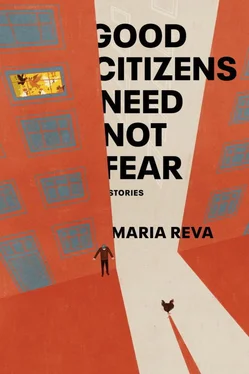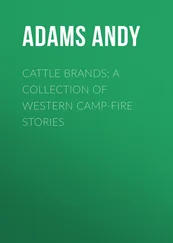I remembered these words when, alone in the apartment the day after I was told about the plan, I let the flame eat away at the ermine coat. The angry fur sputtered in the bathtub, its many ermine backs arching and twisting until, all at once, with a last sigh, they gave in to the flame. Later that evening, when my mother slapped me raw, I lied and said I was only trying to see if the fur was real. It had smelled just like Aunt Milena promised.
—
Now and then, we still find slick black hairs on the sofa bed or on our clothes, and sometimes even a soft white hair. The hairs remind us of Volkov, the debt we owe him, as though he himself shed them for this purpose.
—
This is what I remember most: Before the blackouts. Before the ermine coat, before even the black coats. Aunt Milena’s bag by the door, still unpacked. The four of us squeezed around the kitchen table. We had turned the lights off, lit the candles. Candlelit dinners were a luxury then. I’d learned a new song at school that day, and I taught it to my sister between forkfuls of fried cabbage. Mother got up, drew the curtains, and pulled Aunt Milena to her. As my sister and I sang, they clutched each other, tilting this way and that, as though to keep each other from falling. My sister turned to me, her face a question. “Silly,” I said to her, “they’re dancing.”
Yet again, Zaya is returning to Internat Number 12.
Even as a nineteen-year-old, practically an adult, with a job, three changes of clothes, a new driver’s license, and a rented room back in Moscow.
The internat closed a few years ago, its orphans released to the streets, yet here she is, hurtling toward it in a glossy black cargo van at 100 kilometers per hour. She’s driving the van herself. Her own foot jerks the gas. The key to the iron gates rattles in the glove box. The key itself is iron, without a hint of rust.
—
The van belongs to a twenty-one-year-old heiress named Almaza Shprot. Almaza’s father served as a Minister of Geology in the Soviet days, and now dabbles in the oil and gas business. Almaza owns more than three changes of clothes. In fact, if all her outfits formed a chain, cuff in cuff, and marched from her closet into the sea, the chain would never end.
—
Actually, Almaza’s accountant would correct, the van doesn’t belong to Almaza. It belongs to Almaza’s company. You have to keep these things straight for tax purposes.
How the accountant classifies the company for tax purposes: TRAVEL AGENCY.
And it’s true, the clients do need to travel to the company’s many sites, around Russia, Latvia, and now Ukraine. But the tax forms don’t have a category for the type of service the company renders once the clients arrive at their destination. Is it legal? Who knows? Certainly not a common accountant.
A better question: Is the service transformative?
Any millionaire can frolic with dolphins in Belize, catch a ballet in Paris, clear their complexion with a champagne bath, but how many can say they’ve feared for their lives? That they’ve been trampled on, reduced to nothingness, and from that nothingness been reborn? These days, in these circles—not many.
For instance, one of the company’s trip packages re-creates One Day in the Life of Ivan Denisovich. Clients are carted out to the fringe of the Arctic Circle, to a defunct labor camp. Like the novel’s protagonist, they must mop the guardhouse, lay brick walls with quick-dry mortar, fight over stone-hard bread—all this in freezing temperatures, in too-small boots, while a guard flogs them.
Almaza likes to experience the sites along with the clients. “Ivan Denisovich had one bad day, and got a whole memoir out of it,” Almaza tells them. “Imagine the creative possibilities.”
“I don’t think it was just one day,” an aluminum tycoon remarks, but nobody hears him through the burlap potato sack wrapped over his mouth and nose.
By the time the clients return to Moscow, dirty and bruised, they’re ready to kiss the leather of their cars, kiss their drivers, even—grateful for any simple pleasure.
—
As an employee of the company, Zaya wears many hats. Depending on the trip package, she’s the interrogator or torturer or prison guard, or some combination of the three.
Zaya has considered quitting. It’s as demeaning for her to play the villain as it is for the clients to play victim—maybe more. But who else would hire Zaya, with that mean mangled lip? Her face screams knife fight. Gang affiliation. She’d have to go back to selling cigarette butts at the bazaar, where the company recruiter originally discovered her. And, loath as she is to admit it, she’s good at this job. Better than her predecessors. She can distinguish between the shades of horror in her victims’ faces, knows just how far to push until the victims reveal their most vulnerable spots, their deepest fears. When Zaya thinks back on it, wreaking terror has always been her specialty. As early as age six: one evening after she’d run away from the internat and the boot maker took her in, Zaya let a candle tip, watched the flames lap at the lace curtains. Zaya knew the boot maker wouldn’t let her stay for long anyway, so why not let the flames climb, speed up the parting?
“What’s the most intimate act between people?” Almaza once mused in Zaya’s presence, leafing through a dog-eared porn magazine she’d found under a prison mattress. The throes of pleasure Zaya glimpsed inside resembled torment. “If not sex, then kissing?” asked Almaza.
Every time a client submits to Zaya, she wants to tell Almaza: “It’s this.”
—
“The child who is not embraced by the village will burn it down to feel its warmth.” Almaza had been quoting her favorite African proverb while puttering at the Chernobyl site. She was chucking bits of concrete into a wheelbarrow, her paper hazmat suit crinkling.
The company hadn’t been able to get clearance to use the real Chernobyl—and anyway, the real Chernobyl was looking too tidy these days, with the sarcophagus the French and Germans were erecting over it—so the site was a decommissioned reactor in Latvia. None of the clients seemed to mind.
Zaya urged on the cleanup crew as their faux radiation gauges beeped. They had to shovel sand over any debris they couldn’t lift. One woman, a TV personality with cherry lipstick still caked in the corners of her mouth, fell to her knees in exhaustion. Zaya bent close to the woman’s grimy face, considered her wide dark eyes. “Want pretty blue eyes instead?” she offered, her voice sickly sweet. “I’ll reassign you to Reactor Four. The radiation inside is so high, I hear it does wonders.” The woman stood up, knees shaking.
“My problem?” Almaza went on. “I was embraced too tightly as a child.” Her parents had loved her in a simple, predictable way, giving her everything she wanted. As a result, she didn’t have the capacity to do anything as poetic as burn down a village.
Almaza turned to Zaya, as though remembering that she had been a child once, too. “Where did you grow up?”
Zaya told her.
“How awful,” Almaza whimpered. “Just dreadful.” And then, gleeful: “I can’t imagine a worse place.”
—
Is this where Zaya went wrong? Is it because she evoked for Almaza the tall iron fence, the dark cavernous halls of the monastery, is this how she is being reeled back in now?
But maybe, even if she hadn’t told Almaza about the internat, she’d be driving along this gravel road just the same, drawn in by some other conspiracy of circumstances. She can’t escape the internat’ s magnetic pull. It must be fated, like the lifelong slide toward death.
Читать дальше












